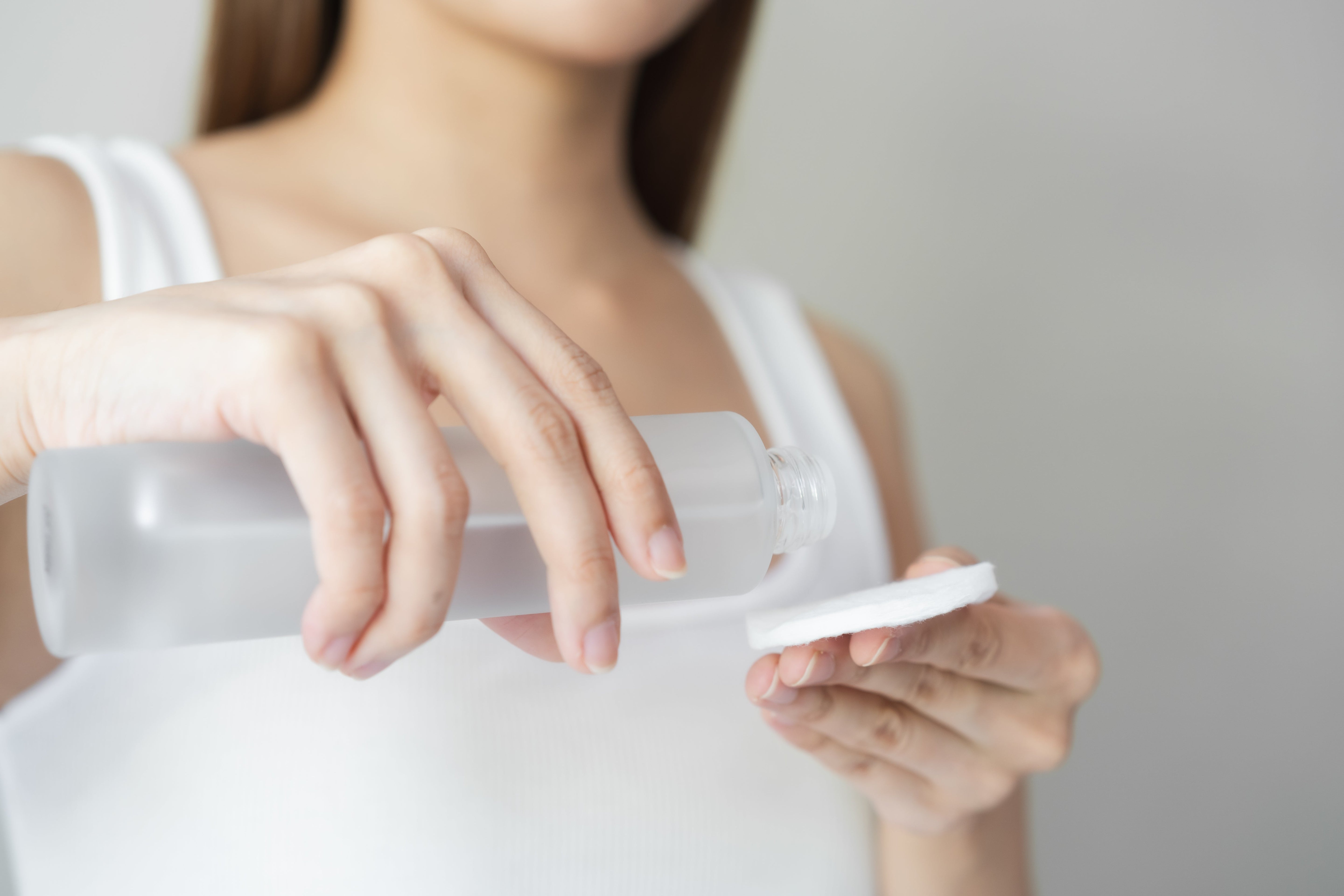Whether it's ten steps or three, you probably already have a skincare routine. Maybe you've carefully formulated it over the years, or you've only just started to find which products work best for you. Whichever it is, do we really know what we're putting on our skin, and the purpose of each step in our routines?
Welcome to The Anatomy of Skincare, where we break down each layer of a typical skincare routine, so that you can craft the perfect routine for you, thoughtfully and with intention.
The Basics of Toners
In the context of skincare, a toner is a product applied after cleansing and often helps prepare the skin for the next steps. It is often known to help remove any leftover residue from cleansing, but can also provide other benefits depending on the ingredients.
What does a toner really do?
The primary role of toners is to gently remove any dirt or grime that may remain on your skin after cleansing, but also to rehydrate the skin. By applying a toner, you are increasing the water content on your skin, making it easier for your skin to absorb additional products. Toners have also been developed to balance the pH of the skin, make pores seem tighter, and help relieve any irritation or infection. The exact benefits that a toner provides depends on its ingredients [1, 2].
Why is it necessary to balance skin pH?
Like most ecosystems in our body, an optimal environment is necessary for the proper microflora to thrive. The same applies for our skin. Skin pH is crucial in maintaining the integrity of the epidermal barrier (the outermost layer of the skin). Changes in the pH can disrupt the microbiome of the skin, leading to irritation, inflammation, and damage to the skin barrier. The ideal pH range is 4.0 to 5.8 for optimal barrier function [5]. This is why you may have seen skincare products, specifically cleansers or toners, that are mildly acidic.
Common Ingredients in Toners
To help you find the toner that your skin needs, we'll go through a few common ingredients in toners and explain the benefits they provide.
AHAs & BHAs
Alpha Hydroxy Acids (AHA) and Beta Hydroxy Acids (BHA) are naturally-derived organic acids that are found in many skincare products. Both are known to help with photoaging, acne, and other skin concerns. AHAs are water-soluble and work primarily on the skin's surface, exfoliating the outer layer of skin and promoting cell turnover. BHAs are lipid-soluble, meaning they can penetrate into the pores, exfoliating and removing any debris from within. A commonly known BHA is Salicylic Acid [7].
Toners with AHAs or BHAs such as Glycolic Acid or Salicylic Acid can help with acne-prone skin, removing dead skin cells and unclogging pores while improving overall skin texture [3].
Hyaluronic Acid
Hyaluronic Acid is a well-known skincare ingredient, popular for its water-retention properties. Hyaluronic Acid helps to keep the skin hydrated, which is crucial for maintaining a healthy skin barrier as well as preventing aging [6].
If you're concerned about dull, aging skin, using a toner with Hyaluronic Acid can help boost your skin's moisture levels and radiance!
Green Tea
Green Tea contains antioxidants that are great for our health but also for the skin. Studies have shown that after 14 to 28 days of use, toners with Green Tea reduced face sebum much more effectively than a base toner. Using a toner with Green Tea can also help counteract free radicals to provide anti-aging benefits [4].
Heartleaf
Houttuynia cordata, better known as Heartleaf, is a plant with heart-shaped leaves that has been gaining popularity in skincare for its multitude of benefits. Heartleaf extract contains humectants which help with skin hydration, has powerful anti-allergic properties making it safe for sensitive skin, and has antibacterial properties which help with clearing up acne. A study has shown that subjects who used a toner containing Heartleaf extract over 8 weeks had reduced levels of sebum and increased skin moisture content [1].
Vitamin C
Vitamin C, also known as Ascorbic Acid, is also a well-known ingredient in skincare, widely praised for its brightening properties. Studies have shown that a lack of Vitamin C can lead to skin aging. There are also studies that show that those with a lack of Vitamin C saw reduction in wrinkles and an increase in collagen production after using skincare products containing Vitamin C [8].
If wrinkles and aging is a concern, your skin may be in need of Vitamin C. Supplement your skincare routine with a toner containing Vitamin C!
Finding Your Perfect Toner
Most toners have the same base function, so it's important to know what specific ingredients are in a toner so that you can pick a product according to your skin's needs. We'll recommend you some of our favorite toners and highlight their key ingredients!

We recommend: Lavido Hydrating Facial Toner
Key Ingredients: Pomegranate, Orange Blossom, and Carrot Extract. This blend of ingredients helps to brighten skin and tighten pores.
Why we love it: This toner helps to balance pH while refreshing the skin and making it more radiant. It uses Lavender hydrosol water which is rich in botanical nutrients instead of typical water, helping to soothe the skin.

We recommend: Lavido Purifying Facial Toner
Key Ingredients: Pomegranate Peel, Orange Blossom, Propolis, and Carrot Extract. Similar to the Hydrating Facial Toner, this blend of ingredients helps to brighten and tighten. However, with the added benefit of Propolis, it provides greater antioxidant and anti-inflammatory properties, making it great for combination or oily skin.
Why we love it: Like the Hydrating Facial Toner, this toner balances pH and uses Lavender hydrosol water to soothe the skin. It is also great at removing any leftover dirt or debris on the skin and in the pores.

We recommend: Fitglow Beauty Sea Ceramide Toning Mist
Key Ingredients: Heartleaf Extract, Red Seaweed Extract, Ceramide + Lipid complex, Hyaluronic Acid. These ingredients help lock-in moisture and boost hydration for a youthful appearance. The Ceramide + Lipid complex is a multi-molecular complex that creates a barrier over the skin, protecting it from any environmental invaders.
Why we love it: This toner is packed with nutrients that are beneficial for the skin. It provides hydration but also balances the skin and tones complexion.
To summarize, toners are a beneficial secondary step to any skincare routine. While it may not always be considered essential, using a toner right for your skin can only provide multiple benefits. Like most products, toners also vary in their main ingredients, so it is important to find one that best suits your skin's needs and concerns.
Still have questions or want to learn more? Feel free to reach out to us — we're always here to help!
Sources
1. Anurukvorakun, O., & Numnim, S. (2023). Development and Clinical Efficacy Evaluation of Facial Toner Containing Houttuynia cordata Thunb. Cosmetics, 10(5), 133. https://doi.org/10.3390/cosmetics10050133
2. Cleveland Clinic (2023). Facial Toners: The Skin Care Product Gets a Reboot. https://health.clevelandclinic.org/what-does-toner-do
3. Jividen, Sarah, RN (2024). Facial Toner: What Does It Do For Skin? Verywell Health. https://www.verywellhealth.com/what-does-toner-do-8421202
4. Oktaviani, D., & Susilawati, Y., & Tjitraresmi, A., & Zuhrotun, A. (2023). The Potential of Natural Based-Skincare Cosmetic Ingredients for Naturally Glowing Skin. Borneo Journal of Pharmacy. 6. 417-436. https://www.researchgate.net/publication/378856352
5. Brooks, S. G., & Mahmoud, R. H., & Lin, R. R., & Fluhr, J. W., & Yosipovitch, G. (2025). The Skin Acid Mantle: An Update on Skin pH. Journal of Investigative Dermatology, 145(3), 509-521. https://doi.org/10.1016/j.jid.2024.07.00
6. Papakonstantinou, E., Roth, M., & Karakiulakis, G. (2012). Hyaluronic acid: A key molecule in skin aging. Dermato-Endocrinology, 4(3), 253–258. https://doi.org/10.4161/derm.21923
7. , , , . The hydroxy acids: where have we been and what's new? Dermatol Rev. 2023; 4: 260-267. doi:10.1002/der2.217
8. Boo, Y. C. (2022). Ascorbic Acid (Vitamin C) as a Cosmeceutical to Increase Dermal Collagen for Skin Antiaging Purposes: Emerging Combination Therapies. Antioxidants, 11(9), 1663. https://doi.org/10.3390/antiox11091663





